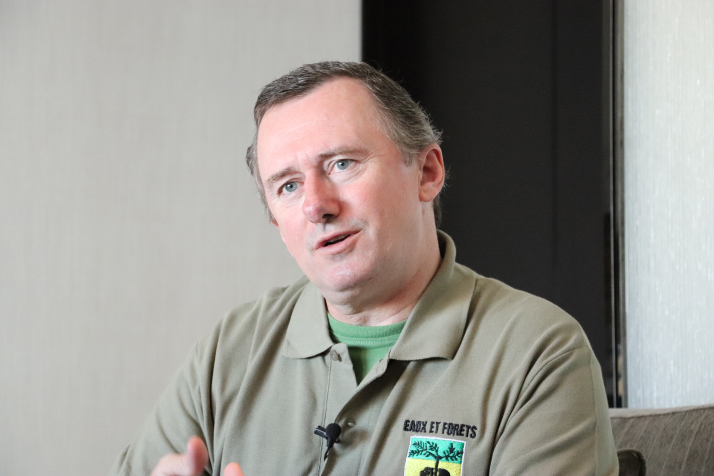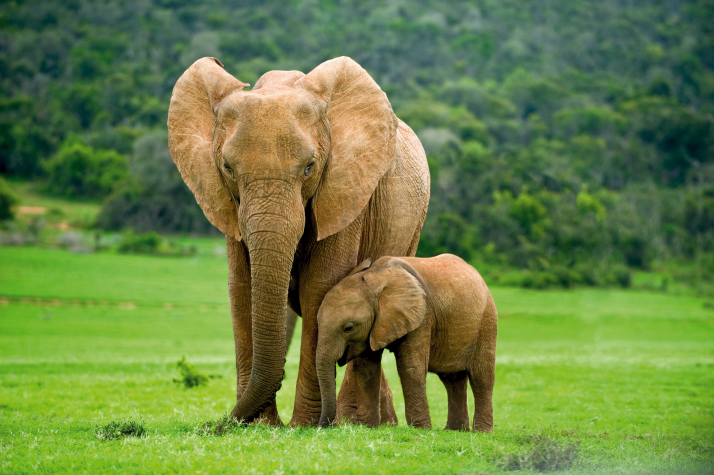|
||||||||||
| Home Nation World Business Opinion Lifestyle ChinAfrica Multimedia Columnists Documents Special Reports |
|
||||||||||
| Home Nation World Business Opinion Lifestyle ChinAfrica Multimedia Columnists Documents Special Reports |
| ChinAfrica |
| Green Treasure Vault |
| Gabon has made great strides in protecting its vast tropical forests |
| ChinAfrica | VOL.11 December ·2019-11-28 |

Lee White, Gabon's Minister of Forests, Oceans, Environment and Climate Change (HU FAN)
For Gabon, one of the most forested countries on earth, located on the Gulf of Guinea off the Atlantic coast, forestry has historically been an important industry. It has an enviable deforestation rate of only 0.01 percent.
The African rainforest in the country covers an astonishing 88 percent of the territory, 21 percent of which are terrestrial protected areas. Not surprisingly, Gabon's contribution to the global climate is obvious, and its forests, along with the rest of the Congo Basin, are critical components in the fight against climate change. In this process Gabon is setting a shining example in stamping out illegal logging of the world's tropical hardwoods.
ChinAfrica sat down with Lee White, Gabon's Minister of Forests, Oceans, Environment and Climate Change, to discuss the country's experience in sustainable management of forest resources. An edited excerpt of the interview follows:
ChinAfrica: Gabon has been a leader in preserving its rainforests. What measures has your country carried out to protect its forests?
Lee White: Since 1992, Gabon has taken a series of actions to craft a new development model that will preserve natural capital, yet still allow us to develop our country.
The first big step was the adoption by the Gabonese Parliament in 2001 of a modern forestry law that makes sustainable management of forests compulsory. In 2002, then President Omar Bongo Ondimba announced the creation of 13 national parks, covering 11 percent of Gabon's terrestrial ecosystems.
However, when President Ali Bongo Ondimba was elected in 2009, just 15 percent of Gabon's timber was being processed within our territory, even though by then the forestry law required this figure to be 60 percent. Gabon was still stuck in the traditional African economic model, providing under-valued, unprocessed natural materials to feed development outside the continent.
He took a decisive action, banning the export of unprocessed timber and creating a special economic zone outside Libreville, the capital city, where fiscal incentives made investment in timber processing attractive. He also adopted a national climate plan, a sustainable development plan and a national land-use plan to ensure that Gabon's forests would continue to play their critical role as a carbon store and sink, vital in the planetary fight against climate change, while also making a proportionate contribution to our economy.
As a result of these policy decisions, we have maintained our forest coverage at 88 percent, our deforestation rate below 0.01 percent and have set aside 21 percent of our territory as terrestrial protected areas.

The Gabonese people pay a lot of attention to environmental protection (HELLORF)
What did your country do to avoid illegal logging?
In 2009, we banned the exports of logs. So all companies in Gabon involved in forestry also have to transform the timber. So we have more and more Chinese companies actually making very nice furniture in Gabon and exporting, at the moment, mainly to China but we are also looking at the American and the European markets. We have more and more sawmills and more refined timber processing units built inside Gabon. When we banned the exports of logs, we also created a special economic zone just outside Libreville, which has quite favorable terms for investment in the forestry sector.
How could Gabon develop a sustainable development policy to find a balance between preservation and exportation?
Gabon is a country that believes in creating a new development model for Africa.
Traditionally, all of our natural resources were taken away from Africa and used outside of the continent. Now, we are trying to develop a sustainable development policy within Gabon and we are trying to find a balance between preservation and exportation.
So, we have a mix of protected areas in the most beautiful and richest parts of the forest and then we have sustainable management concessions mostly organized around the protected areas, which also contributes both to exportation and preservation of wildlife.
How much contribution has the forestry sector made in promoting Gabon's economy?
In the past, the forestry industry did not make a very big contribution to the economy. It was an important employer but did not generate much money, because most of our wood was exported without any form of transformation. For the last 10 years, we have tried to change that. So we are pushing all of the forestry investors to transform the wood into higher value products, which means we can create more money and more jobs with less wood. It can be more sustainable and economically more interesting.
The contribution of forestry to the economy has gone from 5 percent to 13 percent. And, over the next five or six years, we expect to increase that substantially to about 30 percent of the economy. Sadly, if you look around the world, more and more countries are cutting their forests down. So I expect that our precious hard woods would become more and more valuable with time, if we manage them properly.
Does Gabon have cooperative projects with China in the forestry sector?
If we look at Chinese investments in Gabon, it is mostly in infrastructure and the forest industry. What we are trying to do with Chinese companies is to make sure the forestry activities in Gabon contribute to preserving the rainforest.
In terms of forestry, the Chinese overseas aid is actually helping us build a technological training school for the use of timber. China has very good technology for processing timber and making furniture. We have some Chinese companies now that have invested in Gabon and are training Gabonese workmen to make beautiful furniture in Gabon. And we are working together now to create a training center where we will have some Chinese trainers to help develop these skills for our workers in Gabon.
The Chinese investment in Gabon, if we manage it right, will contribute to preserving the forests, therefore preserving the Congo Basin, and maintaining all of the ecological services that the forests provide, including provision of water, and biodiversity.
What are the major challenges of the forestry sector in Gabon?
The Gabonese people do not do much environmental damage. Where Gabon is at threat is from climate change and if we look at our oceans, when I walk along the beach in Gabon, we have pristine beaches, what I would call the wildest beaches on the planet.
There are gorillas and elephants walking on the sand. But those beaches are covered in plastic - plastic bottles, flip flops and so on. The fact is we have turned our oceans into a dustbin, and we are polluting the atmosphere with carbon dioxide which is having potentially catastrophic effects.
So, as I see it, the big environmental issues that we are battling today are these global issues like climate change and marine pollution. Gabon alone cannot solve the problem. We have to create alliances. And I am very encouraged to see that over the last 10 years, China is starting to show some real leadership in these big international issues.
(Comments to xyy@chinafrica.cn)
| About Us | Contact Us | Advertise with Us | Subscribe |
| Copyright Beijing Review All rights reserved 京ICP备08005356号-5 京公网安备110102005860号 |